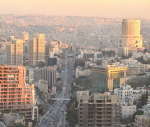You are here
Higher education in the Arab world in a changing world
Nov 04,2019 - Last updated at Nov 04,2019
Jointly, the Jordanian Academicians Society and Yarmouk University organised the second scientific conference on the current and future status of higher education in the Arab region in light of the Fourth Industrial Revolution Engagement (FIRE) in a changing world. Including keynote speeches, more than twenty academic sessions were scheduled over October 22-23, 2019.
It should be noted that FIRE refers to comprehensive and dramatic technological developments, which has fundamentally altered the way we live, work, learn, teach, manage, govern and communicate. Billions of people are interconnected by the Internet through mobile devices, Twitter, Instagram, Facebook, LinkedIn, YouTube and the like.
FIRE requires a response that integrates all stakeholders, including academicians, economists, thinkers, strategists, creative and innovative people, human management and talents. It also calls for a sort of integration between the public and the private sectors. Naturally and apparently, FIRE has the tendency to blend the lines between the corporal, digital and genetic domains.
As a dynamic domain, higher education not only in the Arab region but throughout the world is supposed to signify the most cohesive space for learning, teaching, innovation and creativity. If a certain company or manufacturer gives us a particular product or a service, a university or a college must provide its society with an educated, knowledgeable and skillful graduate who is able to use that service or device.
An outdated pedagogy of teaching that relies squarely on a textbook and memorisation of information to be reprinted by a learner (a student) on a test sheet would not meet levels of excellence demand by FIRE. In its breadth and depth, FIRE requires professors, information providers, trainers and administrators to engage learners in a higher level of critical thinking and ethics in higher education.
In the 21st century, these skills remain essential to the education of all students. As educators, we must continually renew our commitment to teaching these skills, in both formal and informal interactions with our students, in both general education and in the disciplines. The ultimate goal here is to prepare students to be successful problem-solvers and fully engaged citizens as they enter the workforce in an increasing global market and in a fast-changing world.
During the conference, we observed that most of sessions sought to address the need for a strategic change. However, they stopped short of explaining what this change looks like. A change that responds swiftly and responsibly to the priorities of the marketplace and local communities is definitely crucial and most welcome. It should be this response that goes beyond describing the problem and instead heralds the transformation of the process of shared solutions.
Many of the talks at the conference demonstrated that public expenditures for higher education in the Arab region are rising exponentially to the point that exceeds the ability to sustain it. Unfortunately, this situation will cause a deterioration in the quality of education and may lead to institutional closures. Certainly, this problem is not a unique for the Arab world. In fact, we witnessed a number of small colleges, including many in our state Massachusetts, that were forced either to emerge with larger institutions, or closed their campuses altogether, such as Mount Ida College in Newton.
In Massachusetts alone, there have been 15 closures in the last five years. The termination of academic programmes or closing out an institution has a tremendous negative impact on students, faculty, staff and the community at large. However, it should be widely recognised and acted upon as a fact that students (learners), whether they are undergraduate or graduate, are at the core of higher education and they will be the affected by these closures. Hence, professors and administrators are required to work together to ensure student success.
No matter how fast the world is changing and how advanced the communication and social media are, FIRE still embraces both the traditional and advanced practices for enhancing educational experiences for students. These include but not limited to study abroad, internship programme, undergraduate research, service learning and other High Impact Practices (HIP). For instance, after graduating from Bridgewater State University, a good number of alumni had jobs prepared for them as a direct result of their involvement in internship and service learning programmes.
This is a successful model to be emulated for higher education in the Arab world. The region is rich with a variety of resources, governmental institutions, public, nonprofit and private sectors. These entities should be encouraged to work together to offer opportunities to students during the college years and even after graduation. Moreover, within each university or college, there are capable, knowledgeable, intelligent and seasoned faculty, who, with a reasonable amount of academic freedom and financial support, can develop the curriculum with new academic perspectives and professional outlooks.
Developing new curricula is recommended, including programmes of sciences, humanities and social studies to augment pedagogic methods that strengthen students’ qualitative and cognitive skills. The conference called for acknowledging a critical need to determine certain strategies in higher educational development to encounter the current impediments, and anticipated challenges in the near future.














